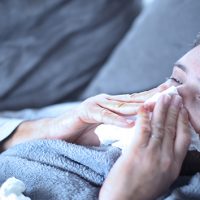
Family and Community Health Associate Professor of Practice
OSU Extension Service/ Deschutes County serving Crook, Deschutes, Jefferson and Wheeler
Counties
3800 SW Airport Way, Bldg. 3
Redmond, OR 97756
Phone: 541-548-6088
Website: http://extension.oregonstate.edu/deschutes
The wildfire smoke seems to be everywhere! Officials warn us to stay indoors when air
quality is poor due to heavy smoke from wildfires. Reduced exposure to smoke helps
protect our lungs, heart, eyes, nose, throat and immune systems. Staying indoors, if
possible, can be one of the best ways to protect against the potentially harmful effects
of wildfire smoke. Start improving your indoor air quality with simple no-cost steps, first.
Get started by preventing smoke from entering the house:
Close all exterior windows and doors.
Select only one exterior door for any needed trips outside away from the clean
area of the house.
Minimize the times you open the door by planning your trips ahead of time.
Close interior doors, especially to areas that have exhaust fans, vents, or dryer
vents.
Only use a bathroom exhaust fan or range hood for short periods.
Minimize the use of clothes dryers if it vents outside.
Minimize bringing smoke particles inside. Individuals returning home from activities with
prolonged exposure to wild fire smoke should consider wiping shoes or boots on a wet
towel before entering the home. Set up a plan so they can carefully remove and bag all
clothing and take a shower before dressing. Launder clothing immediately or as soon as
practical.
Avoid leaving the house, but when necessary, remember to practice six-feet physical
distancing and wear a mask. Cloth masks that can provide protection from COVID-19
will not protect you from wildfire smoke. Look for respirators (masks) marked NIOSH
with N95 or P100. These can be found online or in drugstores, hardware, or home
repair stores. Masks with vents should be taped shut, or a cloth mask placed over the
vent. Frontline healthcare workers use them during the pandemic so they may be in
short supply.
Avoid activities that create smoke or other particles indoors:
Smoking cigarettes, pipes, and cigars.
Using gas, propane or wood-burning stoves and furnaces.
Spraying aerosol products.
Frying or broiling food.
Burning candles or incense.
Vacuuming, unless you use a vacuum with a HEPA filter.
Keep calm
Drinking plenty of water helps minimize and reduce symptoms of scratchy throat and
coughing. Staying well hydrated is the best way to help your body eliminate
toxicants.
Dust or mop surfaces with a damp cloth as needed to keep settled particles from
getting back into the air.
Minimizing aerobic exercise can help reduce exposure to any contaminants that may
be present. Reducing your activity levels are the best ways to reduce the amount of
pollution you breathe into your lungs.
Learn more about how to stress less to improve your resiliency in a disaster.
Stay cool. Run fans, window air conditioners, or central air conditioning. If your window
air conditioner or HVAC system has a fresh air option, turn it off or close the intake.
Filter the air in the room. Additional benefits come from purchasing a portable air
cleaner with High Efficiency Particulate Air (HEPA) filter, upgrading the HVAC system
with best quality high-efficiency filters or making a low-cost portable air cleaner (do not
leave unattended).
Use a commercial portable air cleaner that is the right size for the room. Use high-
efficiency HEPA air cleaning filters, if available. Avoid using an air cleaner that works by
generating ozone, which will increase the pollution in your home. Run the portable air
cleaner continuously on the highest fan setting if you can. Room air cleaners will
provide the most protection when placed where people spend the most time, such as a
bedroom. A good portable air cleaner placed in a bedroom
may be particularly helpful to a person with asthma or
COPD. For retired or homebound individuals, the portable
room air cleaner should be set up in whichever room is
used the most.
To maximize air cleaner effectiveness, operate it
continuously, or as often as possible. Use the highest fan
speed and make sure the airflow to the air cleaner is not
obstructed. Keep outside doors and windows closed to
prevent additional particles from entering the room. During
a wildfire smoke event, commercial portable air cleaners
fitted with high-efficiency filters may reduce indoor particle
concentrations by as much as 45%.
Photo by Glenda Hyde
If you have central HVAC, you can also install or upgrade a high-efficiency filter (MERV
13 or higher) in the system. Run the system’s fan as often as possible to get the most
out of the filter.
A do-it-yourself (DIY) box fan air cleaner is made by attaching a high-efficiency filter
(MERV 14 or higher) to a box fan with a bungee cord or tape. Arrows on the filter need
to point towards the box fan on the air intake side. There is some limited positive
evidence to support its use. However, there are concerns that the box fan motor may
overheat when operated with a filter attached. Use the device with caution and do not to
operate it unattended or when sleeping to avoid any potential fire or electrical hazard.
See these video instructions, “How to make your own clean air fan” from Washington
Department of Ecology. Triangle-shaped versions may be more stable in a
rambunctious household, but may not be as effective since very tiny hazardous particles
can travel through cardboard used to bridge the gap between filters.
See the EPA’s Guide to Air Cleaners in the Home, for more information on commercial
air cleaners and filters.
Taking these steps to improve indoor air quality in your home while you wait for wildfire
smoke to clear will help protect you and your family.
For more information and additional steps you can take, see Improving Indoor Air
Quality from Wildfire Smoke during COVID-19 and Air Quality Guide for Particle
Pollution















